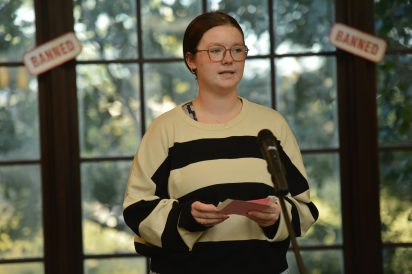‘So 1984’: Waynesburg U celebrates Banned Books Week

The books spread around the Skylight Room of Waynesburg University’s Eberly Library had one thing in common: Somewhere, they’d been pulled off the shelves.
The university held a reading and discussion as part of its celebration of Banned Books Week, created by the American Library Association to advocate for open access to information and spotlight the threats of censorship.
For several years, the university has had an essay-writing competition during Banned Books Week, but expanded it this year to include readings of excerpts from banned books, as performed by members of Waynesburg University’s theatre program.
“We wanted to raise awareness about the freedom to choose what we want to read,” said Jill Peth, the university’s instructional and electronic services librarian.
Wednesday’s event took place amid a years-long rise in library censorship. In 2024, 2,452 different titles were challenged for removal from libraries, the third-highest number since the American Library Association began tracking it, according to its Office for Intellectual Freedom.
Many of the students who came hadn’t been aware that books they’d been assigned to read in school or remembered as formative experiences — Anne Frank’s “The Diary of a Young Girl,” or “Harry Potter and the Goblet of Fire” — had been banned in some states, said Sarah Scott, coordinator of the university’s undergraduate writing center.
“It’s just getting them to that awareness that this type of censorship is going on, even in our nation, where we celebrate the fact that you can actually request a ban on a book, but we can also read those banned books,” she said.
Students read excerpts from a mix of curriculum staples like “To Kill a Mockingbird” and popular young adult fiction like “Mockingjay.” In keeping with this year’s Banned Books Week theme, “Censorship is So 1984,” two selections came from the George Orwell novel that was its namesake.
For this year’s writing contest, students were asked to deliver a persuasive speech for a scenario where their favorite book was about to be banned and removed from the Eberly Library. This year’s winner, Aubrey Lesnett, defended a book she made up — “Whispers Between the Stars,” said to be a fantasy novel about a girl who can hear a mysterious “star stream” with secrets that contradict official narratives.
“To ban it would be to silence a book that encourages readers to think critically, dream boldly and wrestle with questions of responsibility and justice,” she said. “If we remove stories like this from our shelves, we don’t just lose a novel. We lose opportunities for growth, discussion and inspiration.”
Discussion came Thursday in the form of 15-minute breakout sessions, where small groups of teachers and faculty talked about what they’ve learned from banned books, how censorship might impact academic growth and if there are times it might be appropriate.
Students in both sessions said discussions ultimately coalesced around a ratings system similar to those used for TV or movies.
Abigail Heymann, a junior forensic science major from Pittsburgh, said events like Wednesday’s help keep people mindful that book censorship continues to happen.
“These discussions are still relevant even now, and it’s disappointing that it’s even a problem, but it’s important to understand different people’s perspectives on the topic,” she said.

